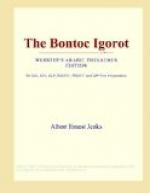Nowhere has the Malayan attained national organization. He is known in the Philippines as a “provincial,” but in most districts he is not even that. The Bontoc Igorot has not even a clan organization, to say nothing of a tribal organization. I fail to find a trace of matriarchy or patriarchy, or any mark of a kinship group which traces relationship farther than first cousins.
The Spaniard created a “presidente” and a “vice-presidente” for the various pueblos he sought to control, but these men, as often Ilokano as Igorot, were the avenue of Spanish approach to the natives — they were almost never the natives’ mouthpiece. The influence of such officials was not at all of the nature to create or foster the feeling of political unity.
Aside from these two pueblo officers the government and control of the pueblo is purely aboriginal. Each ato, of which, as has been noted, there are seventeen, has its group of old men called “in-tug-tu’-kan.” This in-tug-tu’-kan is not an organization, except that it is intended to be perpetual, and, in a measure, self-perpetuating. It is a thoroughly democratic group of men, since it is composed of all the old men in the ato, no matter how wise or foolish, rich or poor — no matter what the man’s social standing may be. Again, it is democratic — the simplest democracy — in that is has no elective organization, no headmen, no superiors or inferiors whose status in the in-tug-tu’-kan is determined by the members of the group. The feature of self-perpetuation displays itself in that it decides when the various men of the ato become am-a’-ma, “old men,” and therefore members of the in-tug-tu’-kan. A person is told some day to come and counsel with the in-tug-tu’-kan, and thenceforth he is a member of the group.
In all matters with which the in-tug-tu’-kan deals it is supreme in its ato, but in the ato only; hence the opening statement of the chapter that no man or group of men holds the control of the pueblo. The life of the several ato has been so similar for such a number of generations that, in matters of general interest, the thoughts of one in-tug-tu’-kan will be practically those of all others. For instance, there are eight ceremonial occasions on which the entire pueblo rests from agricultural labors, simply because each ato observes the same ceremonials on identical days. In one of these ceremonials, all the men of the entire pueblo have a rock contest with all the men of Samoki. Again, when a person of the pueblo has been killed by another pueblo treacherously or in ambush, or in any way except by fair fight, the pueblo as a unit hastens to avenge the death on the pueblo of the slayer.
In such matters as these — matters of common defense and offense, matters of religion wherein food supply is concerned — custom has long since crystallized into an act of democratic unity what may once have been the result of the councils of all the in-tug-tu’-kan of the pueblo. It is customary for an ato to rest from agricultural labor on the funeral day of any adult man, but the entire pueblo thus seeks to honor at his death the man who was old and influential.




